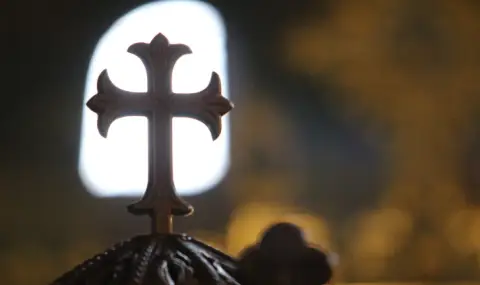On June 25, 1868, the Patriarchate sends to the High Gate its official objections to the two government projects to resolve the Bulgarian church question. The answer suggested the convening of an ecumenical council. After the conquest of Bulgaria by the Turks in 1396 and the destruction of the Patriarchate of Tarnovo, most of the Bulgarian lands were subordinated to the Patriarchate of Constantinople in ecclesiastical terms. With the abolition of the independent Patriarchate of Ipek (1776) and Archbishopric of Ohrid (1767), the remaining Bulgarian lands that had been outside its reach until then came under the spiritual authority of the Patriarchate of Constantinople.
She became a supporter of the Sultanate power, in return for which she acquired the right to receive large incomes from the enslaved Christian peoples in the form of many church taxes, fees, etc. After the introduction in the second half of the 15th century of the custom for the newly elected patriarch to pay the sultan a large monetary gift (peshkesh) in order to receive a beret for his appointment, the robberies and exploitation by the Greek clergy increased even more.
The dissatisfaction of the Bulgarians was expressed from the beginning in actions against the actions and abuses of individual Greek bishops. The population of Vratsa (1824), Skopje (1825), Samokov (1829), Stara Zagora, Kazanlak, Nova Zagora (1836) and others started a fight against them. Thus, a church-national struggle gradually began to form. At the head is the Bulgarian commercial-industrial bourgeoisie. Gradually, she managed to attract the broad masses of the people to the struggle, especially the peasants (who suffered the most from the robberies of the Greek clergy) and urban artisans. The leaders of the struggle were Neofit Bozveli and Hilarion Makariopolski, who won the help of the Bulgarian merchants and craftsmen in Constantinople.
On June 25, 1845, they received from the Tsarigrad Bulgarians the authority to act on behalf of the Bulgarian people; they submit a separate petition to the Turkish government, in which they set out the demands of the Bulgarian people: to install in all Bulgarian dioceses elected by the people and replaceable Bulgarian bishops with a certain monthly salary; that there should be representatives of the Bulgarian people in Constantinople, who would be advocates of Bulgarian interests in front of the High Gate; to allow the construction of a Bulgarian church in Constantinople and the publication of a Bulgarian newspaper. Although the High Gate accepted these requests, the Patriarchate rejected them and exiled the two Bulgarian representatives (end of July 1845). This gives a new impetus to the church-national movement.
The population in Sofia, Samokov, Vidin, Lom, Plovdiv, Pazardjik, Ohrid, Syar, etc. began to fight more energetically for the Bulgarian bishop. Church-national struggle entered its decisive phase after the Crimean War (1853-1856). Hatihumayun, published in 1856, in which ecclesiastical reforms were also foreseen, gave new hopes and a strong impetus to the struggle. In the same year, the Bulgarians of Constantinople, on behalf of 6.4 million Bulgarians in the borders of Turkey, sent a request to the Sultan to be allowed to choose a Bulgarian supreme church and civil chief, who would represent the Bulgarian judicial and other offices to the Sultan. With the second request, attempts to win a certain civil autonomy begin. The Bulgarian emigration in Romania and Russia actively supports the struggle. G. S. Rakovski, Dr. Iv. Seliminski et al.
The Bulgarian municipality of Tsarigrad established itself as the leading center of the Church-national struggles. Its leader was Hilarion Makariopolski, who in 1858 was ordained as a bishop. Its members are Dr. St. Chomakov, P.R. Slaveikov, T. Burmov, G. Krastevich and others. In the Church-National Struggle, 2 currents are outlined: moderate (conservative) and extreme (democratic), or 2 parties – “old” and “young”. The first express the interests of the large merchant-usury bourgeoisie, and the second – of small merchants and artisans. Led by G. Krastevich, the “old” they insist that the struggle be conducted in agreement with the Porte, and the “young”, led by P.R. Slaveykov, are also supporters of extreme measures. By order of the Sublime Gate, the Patriarchate convened a council (1858 – 16 February 1860) to make certain changes in its administration. It was attended by only three representatives of Bulgarian dioceses. The council rejects even the moderate request of the “old” for the appointment in dioceses of bishops who know the language of the local population.
As a sign of protest, the Bulgarian representatives refused to sign the minutes of the meeting. The church-national struggle is intensifying more and more. In many settlements, the population did not accept the newly appointed Greek bishops, there were clashes between Bulgarians and Greeks, etc. The persistence of the Patriarchate of Constantinople convinced the Bulgarian leaders that the people themselves must openly reject its authority. On April 3, 1860 (Easter), Hilarion Makariopolski fulfilled the will of the people and did not mention the name of the Greek patriarch at the solemn service. The Easter campaign raises the spirit of the Bulgarian people. Petitions arrived from all corners of Bulgaria, with which the people renounced the Patriarchate and recognized Hilarion as their spiritual head. Soon after that, he was exiled again together with Auxentius of Veles and Paisius of Plovdiv who had joined the struggle.
In all Bulgarian lands, rallies are held, bishops are expelled, the population does not pay church taxes, etc. The Cretan Uprising (1866-1869), the growth of the revolutionary upsurge in Bulgaria and the passage of the detachments of P. Hitov and Philip Totjo (1867), of Hadji Dimitar and Stefan Karadzha (1868) in Bulgaria forced the High Gate to resolved the church-national question in favor of the Bulgarian people. On February 28, 1870, a firman was issued for the establishment of the Bulgarian Exarchate.
